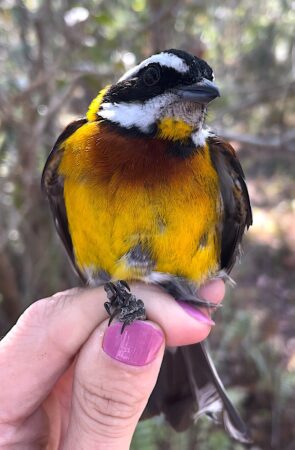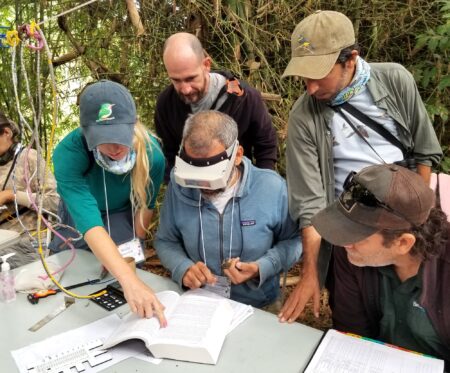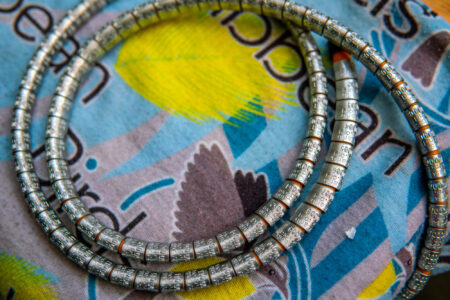Caribbean Bird Banding Network

Bird banding is a monitoring technique used throughout the world to gain valuable data from birds in the hand. While surveys give us a broader picture of landbird communities, banding gives us deeper insights into how these birds are doing, allowing for assessments of body condition, survival, phenology, demography, longevity, and more. Birds are captured and given bands with unique identifying numbers so they’ll be recognized if they are captured again, no matter where they travel.
The mission of the Caribbean Bird Banding (CBB) Network is to increase our knowledge of Caribbean birds by expanding and uniting bird banding operations in the insular Caribbean. The goals of the CBB Network are to:
- Provide training in ethical bird banding techniques
- Provide resources to Caribbean banders
- Foster a community of Caribbean banders that help, learn from, and support each other
TRAINING
Caribbean Bird Banding Training Workshops
CBB Training Workshops provide hands-on training on how to extract and band birds in the field and instructions in banding theory. Workshop participants learn about a range of topics, including bird banding ethics, bird banding basics, molt theory, how to age and sex birds, and bird first aid, among other topics. We strive to ensure that all banders receive top-quality training and always adhere to the Bander’s Code of Ethics. We aim to provide at least one CBB Training Workshop each year, bringing together banders from across the region for a week-long training and practice.

Additional country-specific trainings are funded by CBB Network partners and can be co-organized with BirdsCaribbean, including the assistance of a qualified trainer. These trainings are typically longer (2-3 weeks) and can include a North American Banding Council (NABC) certification session. If you are interested in hosting a training in your country, please let us know!
Read more about our previous CBB Training Workshops!
Nassau, The Bahamas, March 8-12, 2022
- Put a band on it: Updates from our First-ever Caribbean Bird Banding Training
- Becoming a ‘Molt Nerd’ on a Bahamian Beach
Jarabacoa, Dominican Republic, March 8-12, 2023
Stay tuned for more information about future workshops!
Banding Internships
To ensure continued and intensive training in bird banding techniques, BirdsCaribbean has also sponsored Caribbean nationals to take part in internships at established banding stations throughout the Americas. Currently, BirdsCaribbean is partnering with banding stations in the U.S., Canada, and Mexico, with plans to expand partnerships to provide more opportunities. Interns participate in programs for 1 – 3 months, where they are immersed in bird banding with experienced and certified bird banding trainers. After these internships, Caribbean banders leave with much more experience under their belt and are more prepared to begin their own banding program. As banding programs grow in the Caribbean, we are excited to begin sending interns to other Caribbean islands for similar experiences.
Read about some of the CBB interns’ experiences below!
- Bird Banding in the Rockies— A Young Bahamian Shares His Experiences
- From Grenada to Oregon: A Bird Banding Adventure
- Friendships Forged Through Feathers: Musings on the Migration of Two Caribbean Naturalists to Pennsylvania
RESOURCES
BirdsCaribbean bird bands
As part of the CBB Network, we have created Caribbean bird bands and have begun distributing them to permitted and qualified banders in the region. The bands are stamped with contact information so that anyone can report a bird band or banded bird they find.

How can you apply for Caribbean bird bands?
If you are interested in using Caribbean bird bands, you will need to send us:
- a banding CV,
- copies of valid permits from the country where you will be working,
- a brief description of why you will be banding birds including your proposed methods, and
- the quantities/sizes of bands needed.
All band recipients are required to submit an annual report of birds banded with our bands (with data on band number, species, location, and date; optional age and sex).
Our band application form is coming soon!
For now, please send an email to Holly Garrod (holly.garrod@birdscaribbean.org) with all of the required information.
If you find a Caribbean bird band, how do you report it?
Our band reporting form is coming soon!
For now, please send an email to Holly Garrod (holly.garrod@birdscaribbean.org) with the following information: date found, location found, species, and band number.
BirdsCaribbean Bird Banding Database
BirdsCaribbean has developed a database so that banding data can be collected consistently across the islands, and compiled to easily find recaptured birds. The database is hosted on Filemaker, with a user-friendly interface that corresponds with the workflow of the CBB datasheets (see below) for ease of data entry. Any banders are welcome to use our banding database and we will store your banding data in the cloud.
Bird banding protocols, reference sheets, and datasheets
As part of the CBB network, we are committed to providing Caribbean banders with resources to enable easy and consistent data collection. Currently, all of our resources are available in English and Español, and we hope to include more languages in the future.
COMMUNITY
Through the CBB Network, we are aiming to facilitate communication and collaboration among banders in the Caribbean. On our CBB WhatsApp group chat, we share information about banding in the Caribbean, discuss molt in Caribbean birds, and more! We will soon be launching a CBB Network group on the BirdsCaribbean groups.io listserv – stay tuned!
An additional working group of active banders will meet each month to discuss the growth of the network, objectives of the group, and assist in the development of resources.
Please let us know if you are interested in joining any of these groups!
Questions?
Please reach out to the Caribbean Bird Banding Network Coordinator, Holly Garrod (holly.garrod@birdscaribbean.org).
Learn about BirdsCaribbean’s other Landbird Monitoring initiatives here.
